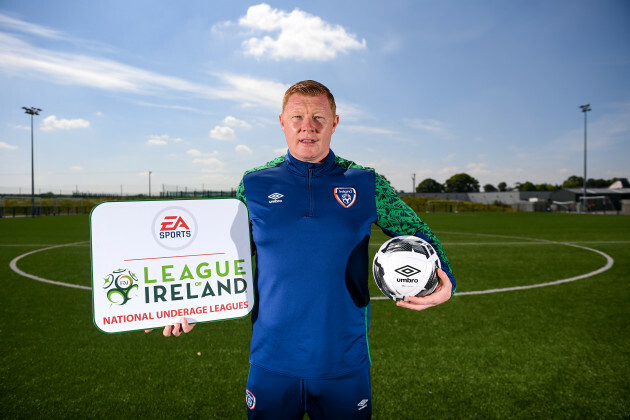“Brexit”, says League of Ireland Academy Director Will Clarke, “presents a golden opportunity for us.”
With the regulations changed to forbid an Irish player moving to a British club until they turn 18 – they can still go to another EU country from the age of 16, a la Kevin Zefi and Cathal Heffernan – more responsibility has now been thrust on the Irish system.
“Probably for the first time in our history, we have to take ownership of our development of our most promising young players”, says Clarke.
Some of the FAI’s long-term plans in this realm remain unclear, with the Association yet to appoint a successor to Ruud Dokter in a new Director of Football role. Waiting for that appointment has meant the Association’s four-year strategy document is understandably light on concrete commitments.
It states that the Player Development Plan will be open to refinement by the new Director of Football, for instance, while plans for a National, residential Centre of Excellence at Abbottstown are being kept under review.
What is clear is that the FAI are maintaining the League of Ireland academy system as the key to elite player development, and this year’s U15, U17 and U19 national underage leagues kick off next week. (The U14 league begins in July, but more on that later.)
Clarke and the FAI have made a few format tweaks to the underage leagues, to address some arising problems.
There are now more games: in 2019 – the last full, Covid-free season – teams were guaranteed 21 games, but that’s now upped to 30. The competitions will split into tiers after the first phase of games, to better guarantee meaningful, competitive action throughout.
U14 and U15 games have been lengthened from 80 minutes to 90 minutes – the justification being that an additional 10 minutes each week adds up to considerably more football over a year – while games have been split into three, 30-minute periods in which every player must be guaranteed at least 30 minutes of game time each week.
To better address the issue of those talented players who are slower to develop physically, U15 teams will now be able to play two players born in 2006 each week, i.e. those who are U16 and are playing at U17 level. (The fact the FAI only have age gradings at every second year from U15s up has been a consistent criticism.)
U19 teams are also allowed to play up to two U20 players each week, along with two senior players of any age: this goes a small way to bridging the current chasm between the U19 leagues and first-team football, with no bridging league in place in Ireland.
“A lot of the changes we have made have been quite progressive”, says Clarke. “There’s a golden opportunity to rethink and reshape how we do youth development in this country and we are all aware that we don’t have the biggest resources in the world so we have to work harder and we have to work smarter.”
Work harder, smarter…and together. Last December, the FAI board made a decision to delay the start of the U14 leagues from March to July, supposedly to avoid disrupting schoolboy teams mid-season. As the calendars for grassroots/schoolboy clubs and the LOI academies are not aligned, academies first recruiting players from U14 do so midway through the schoolboy season.
It was met by a furious backlash, with Shamrock Rovers releasing a statement calling for the FAI to explain a decision they described as “completely random, ill-thought-out decision.” Many LOI academies went ahead and recruited players anyway, organising friendly games among themselves until the league formally kick off. Recruitment from Cork City and Cobh Ramblers led to the Cork Schoolboys League Secretary Eddie Doyle releasing a statement to the Echo newspaper saying the clubs were acting “despicably.”
Long-serving SFAI Honorary Secretary Martin O’Hanlon resigned amid the fallout.
“In relation to that, a decision has been made and it’s up to all different strands of the game to work together to do the best for football going forward”, says Clarke. “The CEO [Jonathan Hill] has publicly mentioned that the FAI are putting a working group together to review the whole transition from schoolboy to underage League of Ireland academies. He mentioned that at a General Assembly meeting last week.
“We’ve had a couple of internal meetings and that group will be expanded in the coming weeks and months. That working group will be made up of people from the FAI, the League of Ireland, the underage section and the schoolboy sector.
Ultimately we have to stop putting people into different boxes. These are football issues and we will address them with football solutions. We have to get away from the ‘us and them’ mentality and to be fair to people in the SFAI, there’s been really good dialogue between the FAI and SFAI, and from our perspective in the LOI department, we have a really close working relationship with the likes of Ger McDermott, who is Head of Grassroots.”
Clarke was also keen to stress a change in emphasis. “We want to put the focus on player development as opposed to the competitions and the competitive nature that has existed in youth football here for the last 30 or 40 years.”
He refers to these changes to match and competition formats as “phase one” of improving youth development in Ireland, and the next phase may prove more challenging.
One of the next pieces of work is the introduction of an academy certification system, similar to the four-category grading system used by the FA in England. The FAI will this year lay out the criteria for their different levels, with clubs invited to apply for a status by the end of the year.
“The academy certification is about trying to improve standards on and off the pitch and making sure there’s checks and balance in place. At the moment we don’t really have any metrics in terms of who is doing well at academy level and development level, again it’s very subjective so we want to put measurements around things like that.
“The big thing about the process is there’ll be a big verification part of that so if a club is saying they are going to do something, then we need to make sure it’s verified. It’s important we incentivise clubs to do a better job in terms of youth development; each club has their own different strategy and viewpoint, from our point of view we need to try and support and reward and incentivise clubs who are interested in youth development.”
Certification and format changes are intelligent and relatively low-cost improvements, but ultimately, the entire system needs significant investment to compensate for the cutting off of the UK route.
Basic training time is a problem: in an interview with The42 in December 2020, prior to taking his newly-created role at the FAI the following March, Clarke pointed out that Irish players at U15, U17 and U19 level were averaging around six hours’ contact time a week, whereas in the UK that figure was at least 15 hours a week.
But this is a product of investment: a UK category One academy requires a minimum of 18 full-time staff, and a budget of at least £2.5 million. Of the 19 League of Ireland academies, only six currently have a full-time director.
“It has improved marginally but nowhere near enough”, says Clarke of elite Irish players’ contact time now. “We have got the changes to formats out of the way, now we’re moving into the second phase, part of that will be academy criteria and the different programmes clubs have in place to increase contact time.
“It’s a massive challenge, we are still heavily reliant on volunteers. We have to tackle these issues now and address them as best we can. I’d like to sit here next year and turn around and say there has been an increase in contact time.”
Clarke says he will be striving to maximise the FAI’s Education and Training Board programmes, and mentions Shamrock Rovers’ link-up with Transition Year students at Ashfield College as education programmes which increase a players’ training time.
Ultimately, however, it comes down to coaching, and the number of coaches.
“There’s a lot of areas we have to look at but ultimately where we need to get to is to have more full-time staff working at academy level in this country. That’s what we have to aim for. That is the long-term objective.”
The FAI will go to government with their strategic document and their plans for youth development in this country, for which they will seek investment. It’s highly unlikely that any of that money will be granted this year, however.
There is much good done and being done…with an awful lot more to do.


